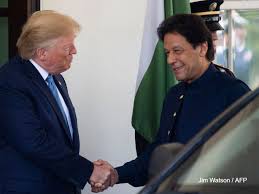Experts warn about challenges in meeting US expectations

Islamabad: Foreign policy experts on Wednesday welcomed progress in ties with the United States made
during Prime Minister Imran Khan’s visit to the United States, but strongly cautioned about the challenges
that lie ahead.
The experts were speaking at a Round-table Conference at Islamabad Policy Institute (IPI) on ‘PM Imran
Khan’s Visit to US: A Review and the Road Ahead’. This was the second in a series of discussions hosted by
the think tank on US relations. The earlier conference held before PM’s departure to US had looked at the
state of the relations and the expectations from the trip, where Foreign Minister Shah Mahmood Qureshi had
delivered the keynote.
Former ambassador to US Mr Ashraf Jehangir Qazi, who has also served in the past as UN Secretary General’s
special representative, said the visit provided a “good beginning”, but there could be problems ahead if things
do not go as expected by President Trump. He said, besides, dealing with an “impatient America”, the other
fear is that there could be some “false flag operation” in Occupied Kashmir, which could be blamed on
Pakistan, to neutralize the positivity generated by the trip.
Amb Qazi also called for not attaching too much importance to Trump disclosure about Indian Prime Minister Narendra Modi requesting him for mediation on Kashmir.
Executive Director Center for International Strategic Studies Amb Ali Sarwar Naqvi said that the bonhomie
seen during Prime Minister’s visit would help bolster Pak-US relations. He said that it remains to be seen how
the understandings reached during the visit would play out in the days ahead.
Prof (Dr) Mujeeb Afzal, who teaches at Quaid-e-Azam University, while listing the positive outcomes of the
visit for Pakistan said that it would reduce US hostility towards Pakistan; Islamabad’s contribution to Afghan
peace were acknowledged; and Modi’s dilemma with regards to Kashmir stood exposed. He, however, feared
that environment of distrust in Washington with respect to Pakistan would continue and delivering the
ceasefire in Afghanistan would be difficult for Islamabad.
“It was a good event, but there was not much of strategic importance in it,” he contended.
Mr Yasir Mahmood, a foreign policy analyst, maintained that Pakistan’s economic compulsions forced the country’s leadership to go overboard. He too mentioned the complications in delivering on US expectations and noted that President Trump is a “desperate person”. Regarding President Trump’s Kashmir mediation
remarks, he said, it would force Modi to prove his anti-Pakistan credentials at home, which could add to Indo-Pak tensions.
Policy Analyst Raza Rumi described the trip as a “door opening” in Pak-US ties. He said re-engaging with US
expands Pakistan’s options with respect to economy and regional security, as America has been a traditional
ally. He said it was important to rebuild US ties because of huge Pakistani diaspora there, the remittances they
send back home, and the fact that America is one of major export destination for Pakistani products.
Executive Director IPI Prof Sajjad Bokhari, in his remarks, said: “There is a feeling that whatsoever President Trump offered to Prime Minister Imran Khan is subject to progress on Afghanistan. It is not unconditional.”
Explaining his contention, he said, the two sides agreed to a mechanism to monitor the understandings reached
during the Summit, but there was no resumption of high level bilateral dialogue, which could have provided a
platform for a sustainable dialogue.





